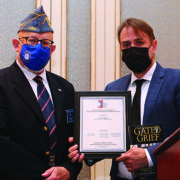Suicide Prevention Awareness
By Jeffrey Blonder
September is National Suicide Prevention Month. During the JWV Annual National Convention in New Orleans, Louisiana last month, members had the opportunity to hear from Dr. Daniel DeBrule, a clinical psychologist, professor, and educator with expertise in anxiety and depression with a concentration in suicide prevention in the veteran community. DeBrule treats many patients in VA clinics.
DeBrule said suicide is unique among the other top ten causes of death in the United States. “We could argue that while there’s a lot of different preventative measures we could take to offset things like cardiovascular disease and diabetes, suicide remains one of the most heavily preventable causes of death in the United States.” He said in the past few years, the suicide rate nationally has decreased – even during the pandemic.
The rate of suicide among both the civilian population and veterans varies based on their location. Those living in the western mountain area of the U.S. are twice as likely to commit suicide as individuals in the Northeast. DeBrule also said men are three and a half times more likely to commit suicide than omen. The method of suicide is also different between men and women. While men are more likely to commit suicide with a firearm, women tend to use firearms, suffocation, or poison – with no apparent preference. DeBrule advised that if there is a loved one of yours that is contemplating suicide it is important that the means to commit suicide be removed. He said the VA now hands out gun locks. “Any veteran who’s going to the VA for care can get gun locks from the VA, but we also have conversations about removing ammunition, giving the firearms to someone else.” DeBrule said locking up or removing guns from the home isn’t about taking away anyone’s second amendment right, it’s about “making sure that if the person is in crisis, or in a window of crisis that we enable them to not have access to those means, to keep them safe, to keep them sound.”
DeBrule also talked about the SAVE program which anyone can use to help a friend or family member in crisis. “These are the tips for SAVE – recognizing the warning signs and risk factors, asking the question, validating their experience, and expediting and encouraging treatment,” DeBrule said. You can find more information about this program at www.mentalhealth.va.gov.
If you are interested in receiving a copy of the Power Point used in DeBrule’s presentation, please contact Programs and Public Relations Director Cara Rinkoff at crinkoff@jwv.org. You can also watch the presentation on the Jewish War Veterans YouTube channel.
If you or someone you love is in crisis, please call the Veteran Crisis Line at 1-800-273-8255.
Volume 75. Number 3. 2021




